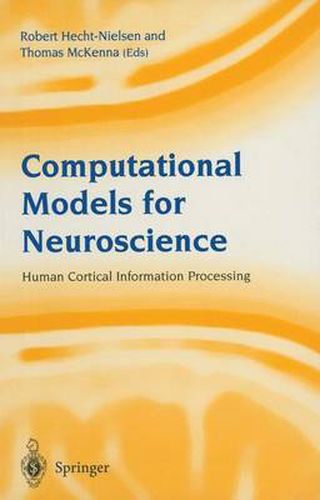Readings Newsletter
Become a Readings Member to make your shopping experience even easier.
Sign in or sign up for free!
You’re not far away from qualifying for FREE standard shipping within Australia
You’ve qualified for FREE standard shipping within Australia
The cart is loading…






This title is printed to order. This book may have been self-published. If so, we cannot guarantee the quality of the content. In the main most books will have gone through the editing process however some may not. We therefore suggest that you be aware of this before ordering this book. If in doubt check either the author or publisher’s details as we are unable to accept any returns unless they are faulty. Please contact us if you have any questions.
Understanding how the human brain represents, stores, and processes information is one of the greatest unsolved mysteries of science today. The cerebral cortex is the seat of most of the mental capabilities that distinguish humans from other animals and, once understood, it will almost certainly lead to a better knowledge of other brain nuclei. Although neuroscience research has been underway for 150 years, very little progress has been made. What is needed is a key concept that will trigger a full understanding of existing information, and will also help to identify future directions for research. This book aims to help identify this key concept. Including contributions from leading experts in the field, it provides an overview of different conceptual frameworks that indicate how some pieces of the neuroscience puzzle fit together. It offers a representative selection of current ideas, concepts, analyses, calculations and computer experiments, and also looks at important advances such as the application of new modeling methodologies. Computational Models for Neuroscience will be essential reading for anyone who needs to keep up-to-date with the latest ideas in computational neuroscience, machine intelligence, and intelligent systems. It will also be useful background reading for advanced undergraduates and postgraduates taking courses in neuroscience and psychology.
$9.00 standard shipping within Australia
FREE standard shipping within Australia for orders over $100.00
Express & International shipping calculated at checkout
Stock availability can be subject to change without notice. We recommend calling the shop or contacting our online team to check availability of low stock items. Please see our Shopping Online page for more details.
This title is printed to order. This book may have been self-published. If so, we cannot guarantee the quality of the content. In the main most books will have gone through the editing process however some may not. We therefore suggest that you be aware of this before ordering this book. If in doubt check either the author or publisher’s details as we are unable to accept any returns unless they are faulty. Please contact us if you have any questions.
Understanding how the human brain represents, stores, and processes information is one of the greatest unsolved mysteries of science today. The cerebral cortex is the seat of most of the mental capabilities that distinguish humans from other animals and, once understood, it will almost certainly lead to a better knowledge of other brain nuclei. Although neuroscience research has been underway for 150 years, very little progress has been made. What is needed is a key concept that will trigger a full understanding of existing information, and will also help to identify future directions for research. This book aims to help identify this key concept. Including contributions from leading experts in the field, it provides an overview of different conceptual frameworks that indicate how some pieces of the neuroscience puzzle fit together. It offers a representative selection of current ideas, concepts, analyses, calculations and computer experiments, and also looks at important advances such as the application of new modeling methodologies. Computational Models for Neuroscience will be essential reading for anyone who needs to keep up-to-date with the latest ideas in computational neuroscience, machine intelligence, and intelligent systems. It will also be useful background reading for advanced undergraduates and postgraduates taking courses in neuroscience and psychology.